|
For Thai people rice has
always been our livelihood, and in more ways than is
commonly appreciated. Few people in this generation, for
example, knew that rice constituted a major war
reparation exacted from Thailand by Allied in 1945. In
normal times the majority of Thai people are engaged in
rice cultivation. Fruits of their labour feed the rest
of the population, and as I have just said, the surplus
feeds parts of the world's population. Rice earns for
Thailand export income of approximately 36,000 million
bahts or 1,500 million U.S. Dollars annually. Thai Ranks
first among leading rice exporting countries. Export
during 1990-1994 average above 4.4 million tons of
milled rice per year, enough to feed 30 million people
outside Thailand. Several times of world serious
rice shortage, Thailand has served as an emergency
source of supply for needed countries.
In Thailand, as in other
major rice producing countries, the rice situation has
direct effect on other related businesses. Local trade
activities, rice mills, rice exports, storage and
transport services, are businesses that benefit
significantly from rice farming activities. When rice
price is high, farmers enjoy better buying power. They
can afford to buy such extras as radio, T.V., electric
rice cooker and more clothing etc. The demands of these
goods, in turn, generate further economic expansion in
other sectors. And vice versa low prices forbade
recession in all sectors of the national economy.
In our tradition, welfare of
the subjects is the chief duty of the monarch. In an
agricultural society, to reassure people of good crops,
kings of the the old days resorted to prays and rituals.
They also assisted farmers by granting them and
distributed seeds and cattle to promote agricultural
activities in their realm. With modern days
technologies, the monarch can extend his benevolent
capacity.
His Majesty the King
carries on the royal tradition of taking personal
interest in rice farming. He makes extensive tours
around the country in order to get first hand
informations. H.M. the King listens and pays close
attention to problems and wishes of farmers. He
implements and adapts current technologies such as
developing water resources, applying cloud seeding
technology to induce rain and encouraging researches on
agriculture. Rice research and experiment farms have
been set up inside the compound of Chitralada Palace,
the royal residence, and they are regularly visited by
farmers, students and other interested persons.
Realizing that the plight of rice farmers is due to
unsatisfactory marketing system as well as old fashioned
farming methods, His Majesty has promoted the setting up
of rice banks all over the country as a communal
institution with the objectives of storing rice for
household consumption in times of high rice prices and
to withhold supply to market in early harvesting period
to cushion the effect of supply over demand and thus low
paddy prices. Rice bank acts also as the storage of rice
strains for the next planting season, and last but not
least, it helps keeping up the communal spirit of mutual
assistance traditional among Thai farmers which is about
to disappear under the present ways of life.
|
|
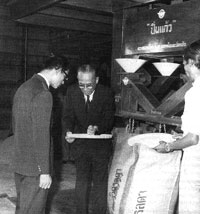
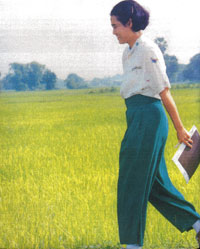
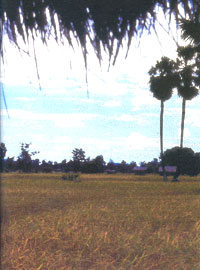
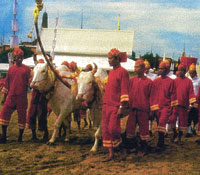
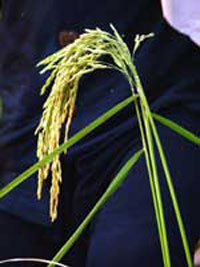 |